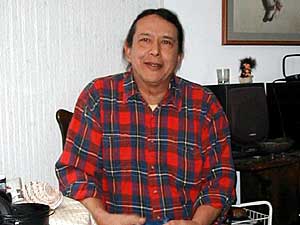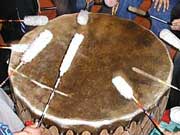Part 1: The spirits spoke to him
August 20, 2003
 |
| Bob Shimek says the discovery of his Anishinaabe spirituallity is like a rebirth. (MPR Photo/Dan Gunderson) |
Bemidji, Minn. — Bob Shimek's small home is nestled in a stand of jackpines just outside the Leech Lake Indian Reservation. Shimek is a soft-spoken man. sitting at his kitchen table -- his black hair pulled back in a ponytail -- Shimek lights a small pile of sage leaves and tobacco. It's something he does when he talks about spiritual things.
"I'm going to burn some of that, and hope that the spirit helpers that watch over this medicine will kind of forgive us and help us, and guide us through this conversation," Shimek says.
Bob Shimek believes the tobacco smoke carries prayers to the Great Spirit. The sage purifies his body and soul. Shimek fans the burning embers with an eagle feather. He cups the smoke in his hands and pulls it toward his face and body. The ceremony is called smudging. He offers a prayer in Ojibwe, and translates.
"Our highest Father, hear me, because I'm a weak and pitiful person. ... And then I said, the spirits know me as Thundercloud. ... I was thanking all the spirit helpers and I was thanking the Great Spirit."
|
It's basically the foundation from which I run my life -- to be Anishinaabe in today's world, and to be the best Anisinaabe that I can be in today's world. It's important to keep these things going.
- Bob Shimek |
The spirits know Bob Shimek as Aniimikiiwanakwad. In English, it means ThunderCloud. Shimek got his Indian name as a child in the 1950s. And for a long time, that's as close as he got to the spirituality of his ancestors.
Shimek grew up on the White Earth Reservation in northern Minnesota in the 1950s. It was a life far removed from mainstream America.
"When I was a kid, it was a bad thing to be an Indian," he says. "It was a difficult time, a time of extreme poverty, a lot of confusion, a lot of chaos, a lot of violence."
In the 1950s, Indian spiritual ceremonies were illegal. They were done in secret. Shimek says few people were invited. His Indian name, Aniimikiiwanakwad, was rarely spoken.
Shimek was introduced to Christianity when he tagged along with neighbors to church. He was baptized Catholic in the second grade. But when he was 8 years old, something happened. He was drawn to an old Ojibwe burial ground on the banks of the Otter Tail River. He says it was there, the spirits first spoke to him.
"Just as clear as a bell, as I was sitting there, this voice from somewhere in those trees close by said, 'It doesn't have to be this way.' It was kind of a comforting and reassuring voice. 'It doesn't have to be this way.'"
Bob Shimek heard the same voice again as an angry, troubled, 17-year-old. He put it in the back of his mind, but never forgot. In his late 20s, Shimek says he was drawn again by the spirits -- this time to a sweat lodge near his home. The sweat lodge represents physical and spiritual cleansing. It's one of the more common ceremonial practices of American Indians.
Shimek was told the sweat lodge experience would change him. He was skeptical. But then an old man started talking and singing in Ojibwe.
"And that whole lodge just started shaking like this great big hand was like this over it. Like that. And the whole thing was just moving," Shimek recalls. "And then pretty soon, there was the sounds of these birds and these animals right in the lodge, and it was like birds. You could feel them flying, you could feel the wind from their wings as they were going around in there. And there was all these animal sounds ... and at some point in there I just broke down and cried like a newborn baby."
That was Shimek's formal introduction to Anishinaabe spirituality. He describes the change as being torn down and rebuilt -- being reborn.
"It's basically the foundation from which I run my life -- to be Anishinaabe in today's world, and to be the best Anisinaabe that I can be in today's world. It's important to keep these things going," he says.
In Ojibwe language, Anishinaabe means "original people." Anishinaabe is the name preferred by many Ojibwe Indians.
|
News Headlines
|
Related Subjects
|

